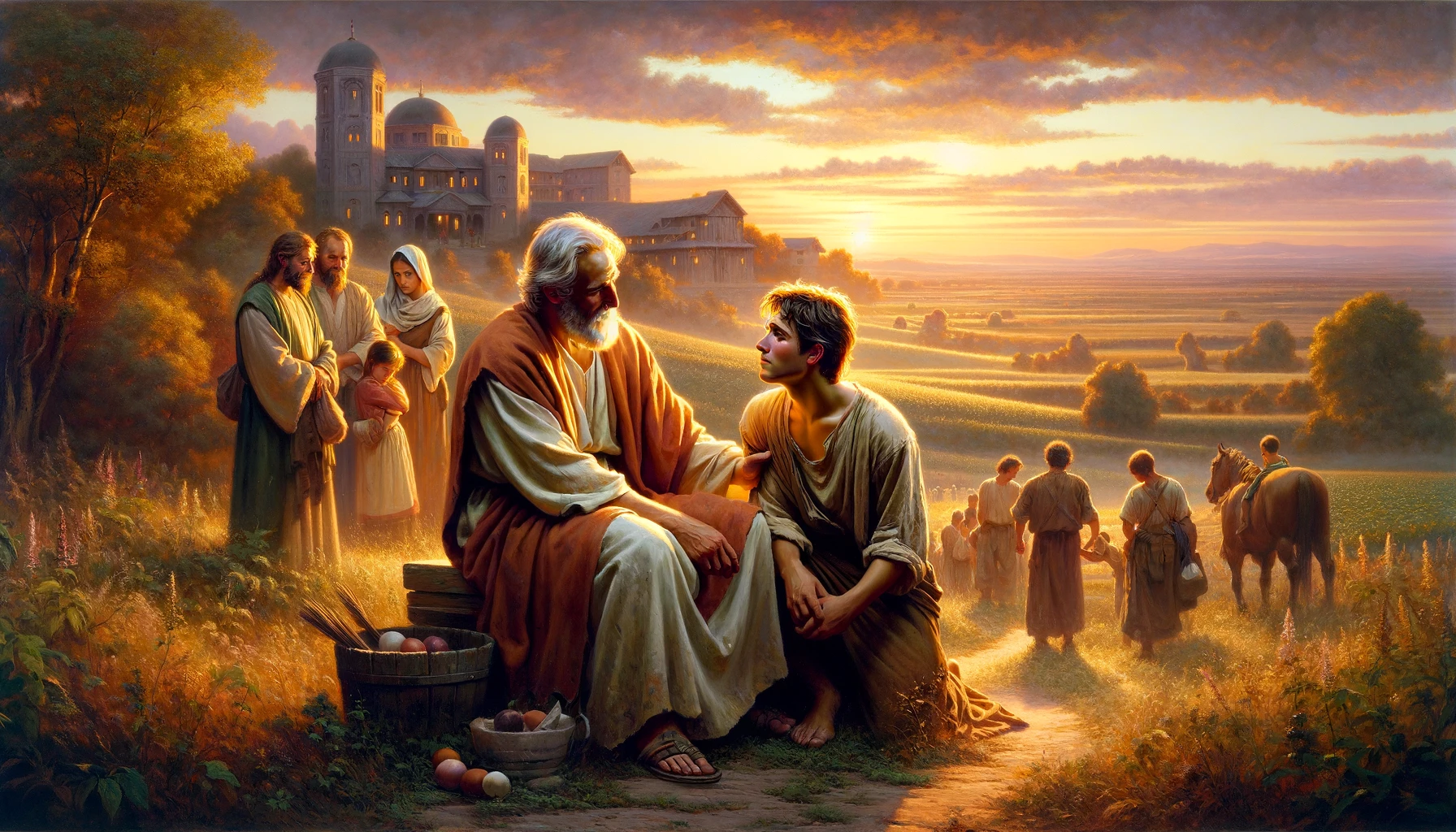"It was fitting to celebrate and be glad, for this your brother was dead, and is alive; he was lost, and is found.'" (Luke 15:32)
The parable of the Prodigal Son was told by Jesus Christ and is recorded in the Bible in the Gospel of Luke, specifically in chapter 15, verses 11 to 32. Jesus shared this story with his disciples, Pharisees, and tax collectors as a part of a series of parables to illustrate the nature of God's forgiveness and the joy in repentance and reconciliation.
The Prodigal Son: Table of Contents
Summary of the Prodigal Son Parable
The parable begins by introducing three characters: a father and his two sons. To summarize the tale, the youngest of the two sons demands his share of his father’s estate which the father gives him.
Shortly after being given his inheritance, he runs off and squanders the wealth “in wild living” (Luke 15:13). Finding himself destitute and in the midst of a severe famine in the land, he hires himself out to a pig farmer. Seeing firsthand that the pigs were eating better than him, he decides to return to his father and beg to be allowed to serve as a hired servant on the estate.
Then, Luke 15:20-24 says this:
“So he got up and went to his father. But while he was still a long way off, his father saw him and was filled with compassion for him; he ran to his son, threw his arms around him, and kissed him.
“The son said to him, ‘Father, I have sinned against heaven and against you. I am no longer worthy to be called your son.’
“But the father said to his servants, ‘Quick! Bring the best robe and put it on him. Put a ring on his finger and sandals on his feet. Bring the fattened calf and kill it. Let’s have a feast and celebrate. For this son of mine was dead and is alive again; he was lost and is found.’”
Meanwhile, though, the older son had been faithfully working in the fields for his father. Seeing his father celebrating the return of his rebellious brother, he felt angry and refused to join the celebration. His father pleaded with his older son to try to understand his joy over the return of what he had lost. It was like his youngest son had been dead and was alive again. He had been lost and now was found! The story concludes with the father pleading with the oldest son.
The Prodigal Son parable ends with Luke 15:31-32, saying:
"And he [the father] said to him, 'Son, you are always with me, and all that is mine is yours. It was fitting to celebrate and be glad, for this your brother was dead, and is alive; he was lost, and is found.'"

Bible Verses: Luke 15:11-32 (NIV)
Jesus continued: “There was a man who had two sons. The younger one said to his father, ‘Father, give me my share of the estate.’ So he divided his property between them.
“Not long after that, the younger son got together all he had, set off for a distant country and there squandered his wealth in wild living. After he had spent everything, there was a severe famine in that whole country, and he began to be in need. So he went and hired himself out to a citizen of that country, who sent him to his fields to feed pigs. He longed to fill his stomach with the pods that the pigs were eating, but no one gave him anything.
“When he came to his senses, he said, ‘How many of my father’s hired servants have food to spare, and here I am starving to death! I will set out and go back to my father and say to him: Father, I have sinned against heaven and against you. I am no longer worthy to be called your son; make me like one of your hired servants.’ 20 So he got up and went to his father.
“But while he was still a long way off, his father saw him and was filled with compassion for him; he ran to his son, threw his arms around him and kissed him.
“The son said to him, ‘Father, I have sinned against heaven and against you. I am no longer worthy to be called your son.’
“But the father said to his servants, ‘Quick! Bring the best robe and put it on him. Put a ring on his finger and sandals on his feet. Bring the fattened calf and kill it. Let’s have a feast and celebrate. For this son of mine was dead and is alive again; he was lost and is found.’ So they began to celebrate.
“Meanwhile, the older son was in the field. When he came near the house, he heard music and dancing. So he called one of the servants and asked what was going on. ‘Your brother has come,’ he replied, ‘and your father has killed the fattened calf because he has him back safe and sound.’
“The older brother became angry and refused to go in. So his father went out and pleaded with him. But he answered his father, ‘Look! All these years I’ve been slaving for you and never disobeyed your orders. Yet you never gave me even a young goat so I could celebrate with my friends. But when this son of yours who has squandered your property with prostitutes comes home, you kill the fattened calf for him!’
“‘My son,’ the father said, ‘you are always with me, and everything I have is yours. But we had to celebrate and be glad, because this brother of yours was dead and is alive again; he was lost and is found.’”
Meaning of the Prodigal Son
Many have concluded that this parable is primarily about the oldest son, rather than the prodigal.
Despite the diverse audience, Jesus was speaking directly to the religious leaders and teachers of the law. He was aiming straight into the darkness of their hearts, pleading with them to lay aside their trust in their own righteousness and works.
“For it is by grace you have been saved, through faith—and this is not from yourselves, it is the gift of God— not by works, so that no one can boast” (Ephesians 2:8-9).
The religious leaders of Jesus’ day were trusting in a works-based justification, rather than experiencing salvation by God’s grace through their faith. Like the older brother in the parable, they viewed themselves as worthy “sons.”
Unless we see ourselves as unworthy, we cannot possibly fall upon the grace of God. Unless we realize that we are spiritually destitute, we will never be saved. It is only the needy who reach out for help or saving.
“Blessed are the poor in spirit, for theirs is the kingdom of heaven” (Matthew 5:3).
Definition of Prodigal
Merriam-Webster gives two senses for the definition of "prodigal":
1: one who spends or gives lavishly and foolishly
2: one who has returned after an absence
Importance of Both Brothers in the Parable
Our sermons can often focus on the younger brother, the brother who physically ran away from home. Often, when we hear the parable, perhaps we can identify with one of the two. Maybe we're like the older brother, who snubs the grace given to him by the father. Even though he's home, he never truly is home. And when the party starts, he refuses to go in to celebrate the lost son's return.
Or perhaps we identify more with the youngest son. Like him, we had squandered our wealth and ran as far away from the church and the faith as much as possible.
Some of us may even identify with the father figure in the story. Maybe we have family members who have gone astray or want nothing to do with us and our Christian faith. Even though many of us have heard the parable a multitude of times, we can always glean new lessons from the story. We likely know someone in our lives who strongly connects to one of the two characters.
But in terms of the sons, we need to realize that both sons are prodigals. No amount of righteous work can ever earn us a spot in heaven. The older brother abused the grace the father had given him. He thought that because he stayed behind that he had earned his inheritance. As Christians, we need to analyze our hearts to see if something similar has happened to us. Do we think we've earned the grace of God? Do we think ourselves superior to other prodigal sons who return home? If so, ask God to transform your heart and join in the celebration that a lost son has returned home.
We Are the Prodigal Son
The prodigal son, or lost son, was an abuser of grace. Grace is most often defined as unmerited or unearned favor. He had a loving father, a good home, provision, a future, and inheritance, but he traded it all in for temporal pleasures. We are the prodigal son.
“We all, like sheep, have gone astray, each of us has turned to our own way…” (Isaiah 53:6).
We think we know better. We squander the grace of God and trade it in for worthless treasure. And yet, at the point that we realize that we are unworthy, living like pigs, sinners, rebels, in need, destitute, hungry, dirty, and empty, so much so that it compels us to run back into the arms of Grace, we will be saved. For it is by grace that we are saved, and all the sinners and tax collectors and prodigals say, “Amen!”
“There is rejoicing in the presence of the angels of God over one sinner who repents” (Luke 15:10).
Here are 15 Bible Verses Every Christian Should Know By Heart for you to download and share with loved ones!
Kristi Walker has been a missionary in Berlin, Germany for over 15 years working with an international church as the Director of Student Ministries. She is the author of two books, Disappointment: A Subtle Path Away from Christ and Convinced. Applying Biblical Principles to Life’s Choices.
Photo Credit: GettyImages/Halfpoint
This article is part of our larger resource library of popular Bible parables. We want to provide easy-to-read articles that answer your questions about the meaning, origin, and history of parables within Scripture. It is our hope that these will help you better understand the meaning and purpose of God's Word in relation to your life today.








